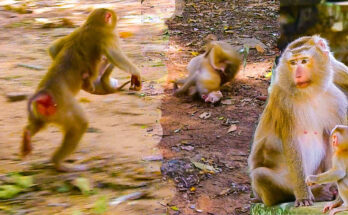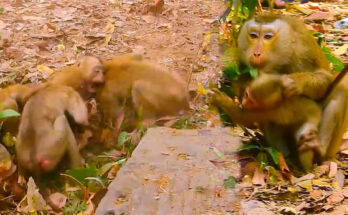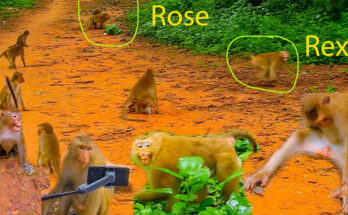Heartfelt Request: Millie’s High Praise for Pongo
In the middle of the dense jungle, where monkeys leap through treetops and the chatter of families echoes through the leaves, a special connection blossomed between two troop members—Millie, a respected elder female, and Pongo, a young and rising male whose behavior began to catch everyone’s attention. Millie was known for her wisdom and fairness, often looked to by others when disputes arose or guidance was needed. So, when she made a heartfelt request praising Pongo, the entire troop listened.
Pongo was not the biggest or strongest male in the group, but what he lacked in size, he made up for in patience, kindness, and intelligence. While other young males were often distracted by dominance displays and competition, Pongo quietly observed, helped the young ones, and stayed close to the females and babies, offering calm energy and support. This did not go unnoticed by Millie, who had raised several babies of her own and experienced the full range of troop life over the years.
One sunny morning, as the troop gathered near a calm stream to drink and groom, Millie called attention by making a series of soft, rhythmic vocalizations—sounds that everyone understood meant “gather and listen.” The monkeys stopped what they were doing. Even the young ones quieted down. Millie climbed to a low branch and looked around before gesturing gently toward Pongo, who sat grooming a tiny baby monkey on his knee.
With a warm expression and slow, deliberate movements, Millie approached and placed her hand on Pongo’s shoulder. She began her heartfelt request, communicating in the complex body language and vocal cues of their kind. Her message was clear: she wished for the troop to recognize Pongo’s value—not as a fighter or dominant male, but as a future leader of a different kind. She praised his calm nature, his gentle heart, and his quiet protection of the young. “This,” her gestures seemed to say, “is what we need more of.”
The troop members looked from Millie to Pongo, some surprised, others nodding in agreement. Moments like this didn’t happen often—elders didn’t usually make such direct statements unless something truly mattered. And Millie’s praise carried great weight.
Pongo, for his part, looked stunned. He wasn’t used to being the center of attention. Yet, as Millie groomed his face gently in front of the others—a sign of deep respect—it was clear that her gesture meant more than just kind words. It was an invitation for the troop to see him as she did: a potential anchor of peace and unity in a group that often faced internal tension.
Over the next few days, the atmosphere in the troop shifted subtly. More monkeys began approaching Pongo, not to challenge him, but to sit with him, groom beside him, and involve him in social interactions. Even some of the dominant males gave him more space, acknowledging Millie’s view. It wasn’t about rank or power—it was about trust and presence.
Millie continued to support Pongo from a distance, never pushing him into leadership, but always being close enough to offer guidance. And Pongo responded in kind. He began taking on more responsibility, helping calm the young during quarrels, and standing protectively near the females with newborns. His actions continued to speak louder than words.
In the heart of the jungle, where strength is often measured by dominance, Millie’s heartfelt request reminded the troop that leadership can also come from compassion. Her high praise for Pongo wasn’t just a moment of admiration—it was a call for change. And in Pongo, they saw the future—a quiet, strong, and caring figure who would guide them with heart, not just force.
And so, through Millie’s wisdom and Pongo’s grace, a new kind of respect grew within the troop—one based on kindness, humility, and the power of quiet strength.


